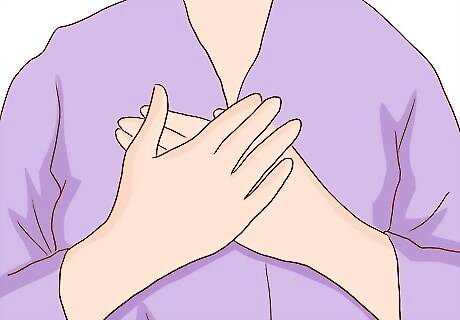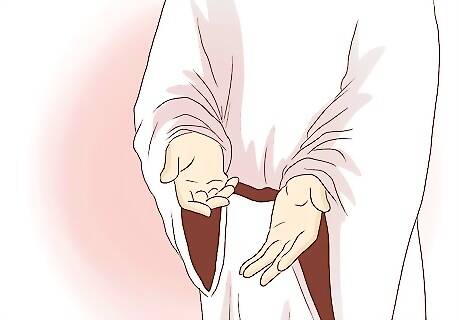
views
Understand the Nature of Sin and Grace

Define sin. In a broad sense, "sin" refers to anything that falls short of the holiness of God. The easiest to spot are usually actions, but sins can also include thoughts and attitudes. Certain actions are considered sins, but the desire to perform those actions is sinful, as well. For instance, wanting to commit adultery is a sin just as actually committing adultery is. Temptation is not a sin, though. If you're put in a compromising situation with someone you find physically attractive, you may feel tempted to act on that attraction. Actually acting on that attraction and committing adultery as a result, or imagining the act of committing adultery even without doing it, is the sin. Simply feeling tempted to do so is not.

Accept the sinful nature of humanity. Even though mankind was created in the image of God, the fall of Adam and Eve—the first humans—signified the fall of all humanity. As a result, humans are sinful by their very nature. In other words, you don't have to be taught how to sin. Sin is already firmly fixed inside of you at the very core of your being from the time of your birth.

Understand the significance of Christ's sacrifice. When Jesus died on the cross, He carried the sins of humanity with Him. Christ's sacrifice canceled out the debt of original sin. In the Old Testament, animal sacrifices were used as a way to repent for the sins of flesh. Even these sacrifices were imperfect, though, so the stain of original sin still remained. As both Son of God and Son of Man, Jesus became the “perfect sacrifice,” capable of freeing the human soul from the chains and punishment of original sin.

Know what it means to be "free from sin." Accepting Christ and being freed from sin does not mean that you will never do another wicked thing ever again. Christ's sacrifice freed your spirit from the shackles of sin. Your flesh—including your body, mind, and heart—will still have to deal with everyday sin. Your soul can be free from sin even though your body still sins. Being free from sin on a soul level should mean that you also seek freedom from sin on a physical level, though, even though it can never be permanently reached.
Address Your Sinful Nature

Turn to Christ. As previously noted, Jesus saved the soul from the consequences of sin by sacrificing Himself on the cross. You must make a conscious decision to accept the offer of salvation before your soul can truly be free, however. If you haven't done so already, ask Christ to come into your life, forgive your sins, and set you free. This is a crucial first step. Without relying on Christ to free you from original sin, you'll still be captive to sin in all its forms.

Love God more than you love sin. Doing the right thing out of a sense of duty is legalism, and it isn't what God wants. God wants your love. If you come to love God more than you love your sins and the temporary pleasures those sins bring, you will naturally begin to shift away from your sinful nature. Focus on doing good works—the works of the Spirit—before worrying about avoiding wicked works of the flesh. When you fix your eyes on that which is good, you are less likely to be drawn toward that which is evil. When addressing a specific sin or temptation, overcome that evil with something good. For instance, do something nice for someone you love instead of simply telling yourself to stop stewing in anger toward someone else. Acting on the impulse to do something good can distract you from an otherwise bad impulse to do bad more effectively than doing nothing would.

Recognize the seriousness of your own sin. Habitual sins embed themselves into a person's life in a way that makes them difficult to acknowledge. You may tell yourself that a particular sin is nothing more than a “bad habit” and, as such, isn't that serious. Breaking free from that sin and a lifestyle of sin can only happen once you acknowledge just how serious your own sins are. All sin is evil and falls short of God's holiness. This includes both the littlest lie and the most gruesome murder. Addiction support groups usually ask their members to begin by admitting to the addiction. A person cannot fix a problem until he or she admits to having it. In the same way, you can only break away from sin by admitting to the sins you've committed.

Vow to resist sin in your heart. Promise God that you will intentionally avoid sin and seek good. You will inevitably mess up sometimes, but the intention to stay on the right path must be firm and true. If you are unable to make this vow, you may need to do some soul-searching. If your desire to resist sin still isn't sincere and that lack of sincerity is causing you to hesitate, pray to God, asking Him to give you the right heart and mind to abandon your sinful lifestyle and turn to a life in the Spirit.

Embed the Word of God in your mind. One of the biggest powers you have against sin in your life is the Word of God. Study the Scriptures regularly. Your goal should be purity of understanding rather than mere memorization. A thorough understanding of God's Word can help you identify sin more readily and prepare for the temptations and traps that could lead you there. Moreover, regular Bible study can also strengthen your faith and make you more aware of God's promises. As your understanding of God's love increases, your desire to love the things that God loves will increase, too, making it easier to resist that which is wicked.

Pray with sincerity and devotion. Ask God to guide your steps and help you avoid sin. Pray in this manner continually, regardless of whether or not you are actively facing a present temptation. Prayer of all kind is a useful tool in the fight against sin, even when you don't specifically pray for strength against temptation. Through prayer, you can communicate with God, which allows you to grow in your relationship with Him. As your love for God deepens, your interest in sin will usually fade away more effectively.
Deal with Everyday Sin

Watch for the movement of sin in your life. Every person has his or her own weak points, and those weak points may vary from person to person. Identify your own by looking for signs of sin in your own actions and thoughts. Habitual sins are often the hardest to identify, even though they're the ones you are most familiar with. That being said, you can usually spot them by looking for thoughts and actions that drive a wedge between you and God.

Flee from temptation. Don't test your faith by intentionally putting your soul in harm's way. When you see temptation lying ahead of you, avoid it instead of confronting it. Ultimately, the goal is to avoid sinning, so any steps you can take to reach that goal are good steps to take. To that end, it is wiser to avoid the temptation to sin altogether when doing so is possible since confronting temptation only increases your risk of caving in. For instance, if you were preparing for a major exam and accidentally found a copy of the instructor's answer sheet, holding onto that answer sheet for the duration of that exam will make you more likely to use it. Disposing of it or returning it to the instructor removes the temptation of cheating from you, thereby guaranteeing that you won't do it.

Walk alone and walk with others. Your commitment to a life free of sin must be a personal one. Mingling with people who can help you stay committed can be beneficial, but you also need to be prepared to walk apart from the crowd. Following the crowd constantly will get you into trouble, even if the crowd seems to be made of religious or well-meaning people. Everyone is flawed. You need to be able to see and follow the path that God has put in front of you regardless of whether or not anyone else is following it. On the other hand, spending time with people who share your beliefs can be a good thing because they can help keep you accountable. You can also use these human relationships to enhance your understanding of God through discussion and acts of love.

Repent immediately. When you do sin, repent immediately and with sincerity. Don't delay or waste time trying to justify your actions. Excuses to yourself and God will hinder your improvement. Even though your soul has already been freed from the chains of original sin, you can only release your spirit and conscience of your own sins by taking them to God and asking for forgiveness. In the midst of your repentance, you should also ask for the strength to turn away from the same sin in the future.

Refuse to give up. No matter how many times you fall, you need to pick yourself back up and keep trying. The struggle against sin in your life is not a “one time” issue. It's something you'll need to face throughout your entire life. The good news is that it's a struggle you don't have to face alone. God has freed your soul from sin and will not abandon you in your efforts to resist sin in the flesh. The final victory belongs to God, and as long as you cling to Him, you'll experience the benefit of that victory. Remind yourself of the reward waiting for you by regularly meditating on the promise of salvation that God has made to you. Sin can seem like a very appealing source of immediate satisfaction, so thinking only of the present moment can make it difficult to resist sin. Shift your focus to the even greater source of satisfaction waiting for you in the future.




















Comments
0 comment